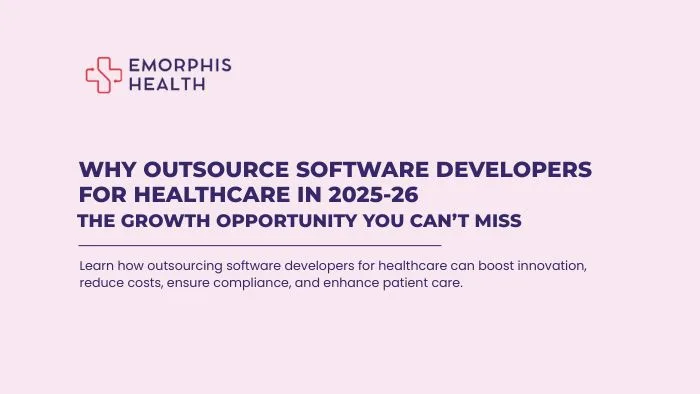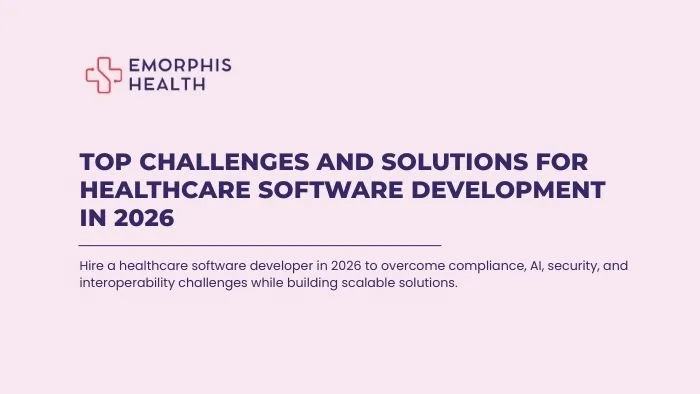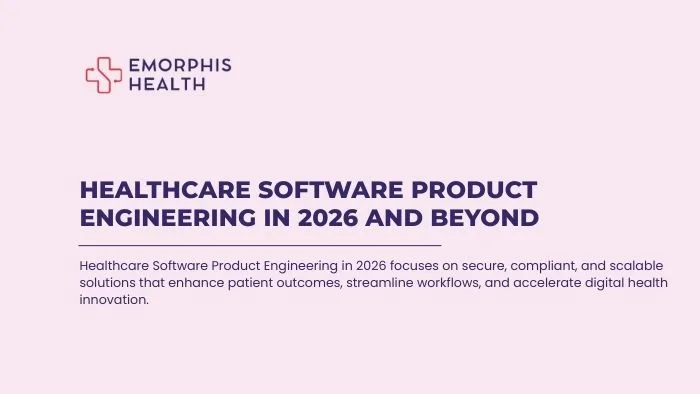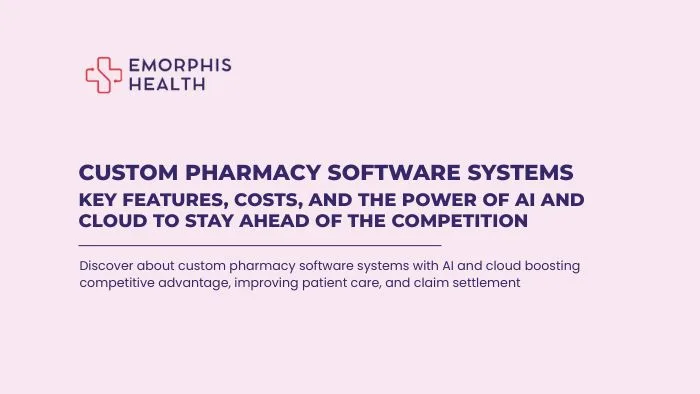Healthcare IT Outsourcing to Grow 88% by 2034
See Contents
- 1 Healthcare IT Outsourcing to Grow 88% by 2034
- 2 Benefits of Outsourcing Software Developers for Healthcare
- 3 Challenges in Healthcare IT and How Outsourcing Solves Them
- 4 Key Considerations Before Outsourcing Software Developers for Healthcare
- 5 Future-Ready Trends That Make Outsourcing Inevitable
- 6 Connect with Emorphis Health
- 7 Conclusion
The global healthcare IT outsourcing market, valued at $79.56 billion in 2025, is projected to reach $150.13 billion by 2034, marking an 88% growth over the forecast period. With a CAGR of 7.31%, outsourcing is rapidly becoming the go-to strategy for healthcare providers seeking scalability and cost efficiency. North America held a dominant 56% share in 2024, while the Asia Pacific is set to experience the fastest growth ahead. Among service types, the payer’s HITC outsourcing segment led the global market in 2024, and by end user, healthcare provider systems captured the largest share in 2023. (source). We will further see why to outsource software developers for healthcare in 2025-26.
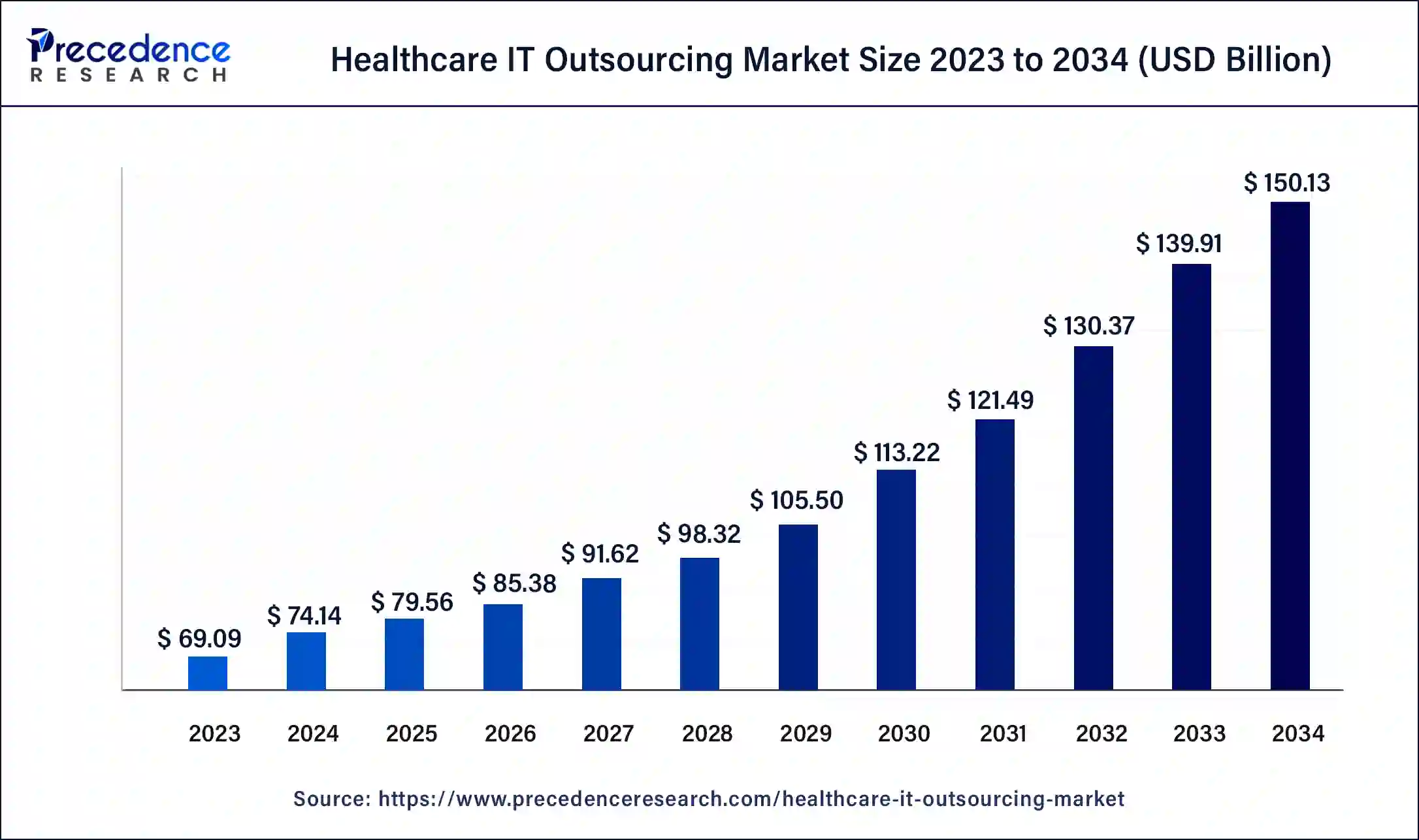
The U.S. healthcare IT outsourcing market, valued at USD 29.58 billion in 2024, is projected to reach USD 60.86 billion by 2034, growing at a CAGR of 7.48%. North America leads this market, driven by a strong healthcare system, high investments in technology, and growing demand for solutions like electronic health records management and telemedicine. The U.S. stands out with its reliance on outsourcing for data analytics, cybersecurity, and cloud computing, which enhances operational efficiency and patient care. Additionally, stringent regulations such as HIPAA are pushing healthcare organizations to adopt outsourcing solutions to ensure compliance and maintain quality standards.
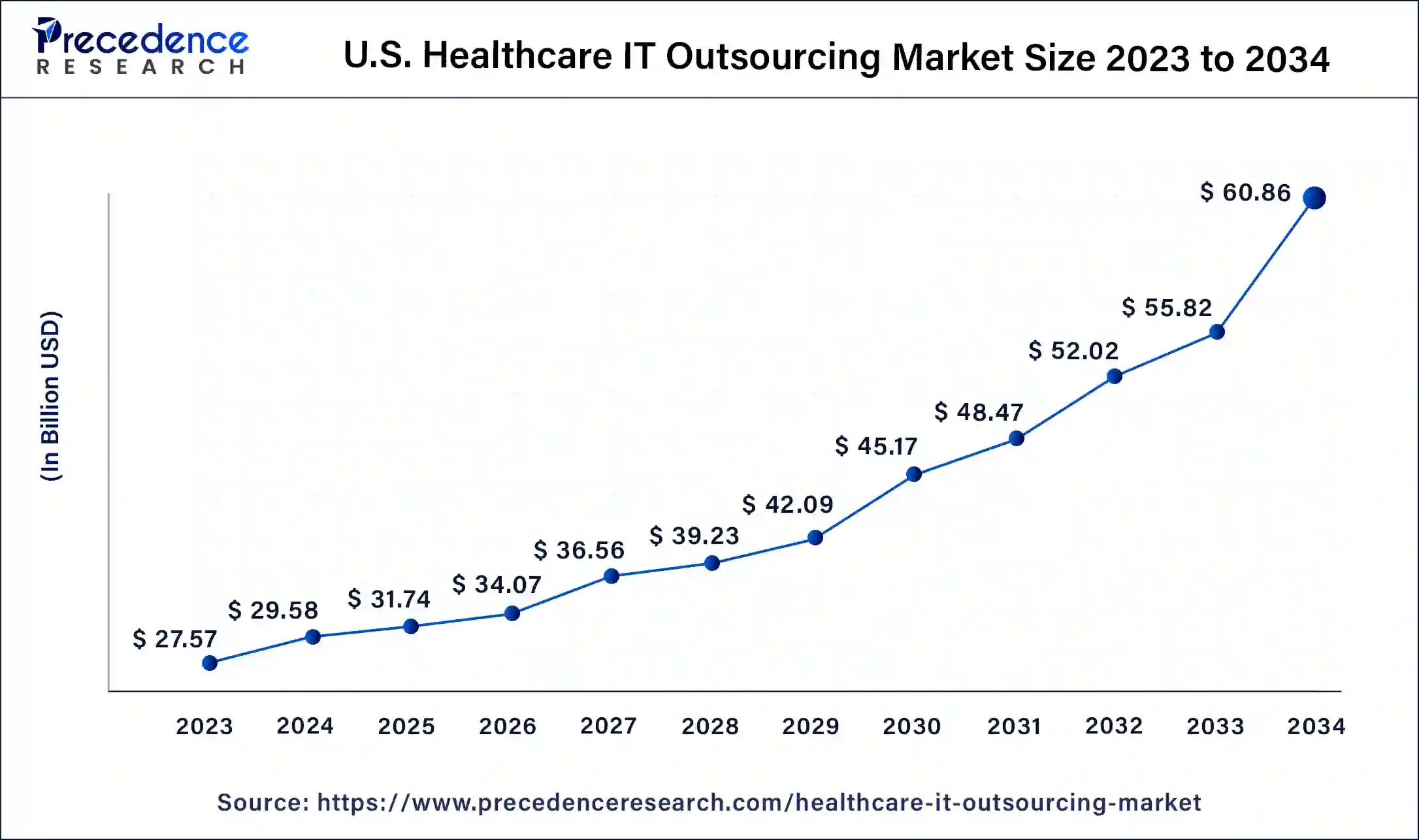
Healthcare is rapidly evolving, with technology at the heart of every innovation. From electronic health records (EHR) to telemedicine platforms, healthcare providers are increasingly relying on digital solutions to deliver better patient care. In this scenario, healthcare organizations that choose to outsource software developers for healthcare gain a strategic advantage. By leveraging external expertise, they can build scalable, secure, and innovative solutions without the burden of recruiting and managing large in-house teams.
The need to outsource software developers for healthcare is driven by several critical factors:
-
Rising Demand for Digital Health Solutions – Patients now expect seamless digital experiences, from teleconsultations to AI-powered diagnostics. Outsourcing allows healthcare providers to meet these expectations quickly and efficiently.
-
Increasing Complexity of Healthcare IT Systems – Integrating multiple systems, EHR platforms, and patient monitoring tools is highly complex. Outsourcing healthcare IT ensures that experienced professionals handle these integrations while maintaining compliance.
-
Shift Toward Patient-Centric Care – Modern healthcare is moving toward personalized care. Providers must focus on improving patient outcomes while optimizing internal processes, which makes it crucial to outsource software development to specialized teams.
-
Adoption of Cloud, AI, and Interoperability Solutions – Advanced technologies are transforming healthcare delivery. Organizations that outsource software developers can implement AI, cloud computing, and interoperable solutions faster and more effectively.
Hence, outsourcing is no longer just a cost-saving strategy; it has become a necessity for healthcare providers looking to stay competitive in 2025-26.
Benefits of Outsourcing Software Developers for Healthcare
Healthcare organizations that choose to outsource software developers for healthcare can unlock multiple benefits that directly impact innovation, cost-efficiency, and operational efficiency. Below are the key advantages that cannot be missed:
1. Faster Innovation and Product Deployment
Healthcare is a fast-moving industry, where delays in software development can affect patient care and organizational efficiency. By choosing to outsource software developers, healthcare providers gain access to skilled teams that are already experienced in developing cutting-edge applications. Whether it’s telemedicine platforms, EHR integrations, or AI-driven diagnostic tools, outsourced teams accelerate the product development lifecycle, allowing healthcare organizations to bring solutions to market faster.
2. Cost Optimization Without Compromising Quality
One of the biggest drivers for outsourcing healthcare IT is the ability to manage development costs efficiently. Hiring and maintaining in-house teams can be expensive due to salaries, training, and infrastructure. Outsourcing allows organizations to reduce the cost of software development while still accessing top-tier expertise. This cost advantage ensures that healthcare providers can invest in innovation without overstretching their budgets.
3. Access to Specialized Skills and Global Talent Pools
Healthcare software development requires niche skills, from cybersecurity and cloud computing to AI and IoT integration. By choosing outsourced healthcare services, organizations can tap into a global talent pool, gaining access to experts who have hands-on experience with complex healthcare systems. This ensures that projects are executed with precision and quality, leveraging the latest tools and technologies.
4. Scalability to Handle Fluctuating Demands
Healthcare demands can fluctuate rapidly due to regulatory changes, patient influx, or new technology adoption. By opting to outsource software developers, healthcare organizations gain the flexibility to scale their development teams up or down as needed. This flexibility allows providers to handle multiple projects simultaneously without the overhead of permanent staffing.
5. Enhanced Focus on Core Healthcare Operations
Outsourcing software development allows healthcare organizations to concentrate on what matters most: patient care. By entrusting outsourced healthcare services to skilled developers, providers can focus on improving clinical outcomes, patient experience, and operational efficiency, rather than managing complex IT projects internally.
6. Improved Compliance and Security
Healthcare IT systems are subject to strict regulations like HIPAA. Outsourced teams specializing in outsourcing healthcare IT understand these regulatory requirements and ensure that software solutions are compliant and secure. This reduces the risk of costly violations and safeguards sensitive patient data.
In essence, outsourcing software developers for healthcare is more than just a cost-saving measure; it’s a strategic decision that drives innovation, scalability, and regulatory compliance.

Challenges in Healthcare IT and How Outsourcing Solves Them
While outsourcing offers significant benefits, healthcare organizations also face critical challenges that must be addressed when they outsource software developers for healthcare. Here’s a breakdown of common challenges and how outsourcing provides effective solutions:
1. Cybersecurity and Data Protection
Challenge: Healthcare data is highly sensitive, and breaches can have severe consequences, including legal penalties and reputational damage.
Solution: By opting for outsourced healthcare services, organizations gain access to developers specialized in secure coding practices, data encryption, and compliance with HIPAA and other regulations. This ensures robust protection for patient records and other sensitive information.
2. Compliance with Evolving Healthcare Regulations
Challenge: Healthcare regulations constantly change, making it difficult for in-house teams to keep software compliant.
Solution: Teams that specialize in outsourcing healthcare IT are well-versed in regulatory standards and continuously update their practices. This ensures that all software development adheres to HIPAA, GDPR, and other healthcare-specific requirements.
3. Legacy System Modernization
Challenge: Many healthcare providers operate on outdated systems that are difficult to integrate with modern technologies.
Solution: Outsourced developers bring expertise in modernizing legacy systems while ensuring seamless integration with new solutions like cloud platforms, AI tools, and telemedicine applications. This reduces downtime and enhances operational efficiency.
4. Interoperability Across EHR and Healthcare Platforms
Challenge: Multiple healthcare systems often fail to communicate with each other, limiting data sharing and operational efficiency.
Solution: By choosing to outsource software development, providers can leverage developers skilled in APIs, HL7, FHIR, and other interoperability standards to create seamless connections across diverse healthcare platforms.
5. Limited In-House Expertise for Emerging Technologies
Challenge: Implementing AI, IoT, or predictive analytics requires specialized knowledge that many in-house teams lack.
Solution: Outsourcing allows healthcare organizations to access a global talent pool of experts who can develop advanced solutions quickly and efficiently. Using outsourced healthcare services, providers can adopt new technologies without the need to train internal staff extensively.
6. Scalability and Resource Constraints
Challenge: In-house teams may struggle to scale quickly in response to sudden increases in project scope or demand.
Solution: Outsourcing provides flexibility. Healthcare organizations can scale their development teams up or down, accessing outsourced software developers as needed to meet project deadlines and changing demands.
While healthcare IT development has its challenges, outsourcing offers tailored solutions that address cybersecurity, compliance, legacy systems, interoperability, and scalability. This makes it a strategic choice for organizations looking to innovate while minimizing risk.
Key Considerations Before Outsourcing Software Developers for Healthcare
While the benefits of outsourcing are clear, healthcare organizations must carefully evaluate several factors before they outsource software developers for healthcare. Making the right choice ensures that projects are delivered on time, meet quality standards, and comply with healthcare regulations.
1. Domain Expertise in Healthcare Solutions
Not all software developers have experience in healthcare-specific applications. When you outsource software developers, ensure the team has a strong background in developing EHR systems, telemedicine platforms, and patient management software. Leveraging outsourced healthcare services with domain expertise reduces errors and accelerates development.
2. Compliance Readiness
Healthcare software must comply with stringent regulations such as HIPAA, GDPR, and other local laws. Teams specializing in outsourcing healthcare IT are familiar with these requirements and can develop compliant solutions from day one, minimizing legal and operational risks.
3. Communication and Collaboration Practices
Effective communication is critical for outsourcing success. Whether you outsource software development domestically or internationally, ensure the team has clear reporting structures, collaboration tools, and regular updates to align with your project goals.
4. Proven Track Record with Healthcare Providers
Before committing, check the outsourcing partner’s experience with healthcare clients. A reliable provider offering outsourced healthcare services will have case studies, references, and success stories demonstrating their ability to deliver high-quality solutions.
5. Scalability and Long-Term Support
Healthcare projects often expand in scope over time. Choosing to outsource software developers with flexible scaling options ensures that your development team can grow alongside your organization’s needs, avoiding delays and additional recruitment costs.
6. Cost Transparency
Understanding the outsourced software development cost upfront is essential to avoid budget overruns. Look for partners who provide detailed cost structures, flexible engagement models, and clear deliverables while maintaining quality standards.
In essence, evaluating these factors helps healthcare organizations maximize the benefits of outsourcing while minimizing risks, ensuring a smooth development process, and achieving successful project outcomes.
Future-Ready Trends That Make Outsourcing Inevitable
As healthcare continues to evolve, outsourcing is no longer just a cost-saving measure—it is becoming a strategic necessity. Organizations that outsource software developers for healthcare are better positioned to adopt emerging technologies and stay competitive in 2025-26.
1. AI-Powered Healthcare Applications
Artificial intelligence is transforming diagnostics, predictive analytics, and patient care management. By choosing to outsource software development, healthcare providers gain access to teams skilled in AI algorithms, machine learning models, and data analytics, enabling faster implementation of intelligent solutions.
2. Telemedicine and Virtual Care Platforms
The demand for remote healthcare services continues to rise. Outsourced teams can rapidly develop secure, scalable telemedicine platforms, ensuring providers can extend care beyond physical locations. Outsourcing healthcare IT allows organizations to implement these solutions efficiently, without overwhelming in-house teams.
3. Remote Patient Monitoring and IoT in Healthcare
IoT devices and remote monitoring tools generate large volumes of patient data that require sophisticated software solutions. By leveraging outsourced healthcare services, organizations can integrate these devices, manage data streams, and provide actionable insights to clinicians while maintaining security and compliance.
4. Predictive Analytics and Personalized Medicine
Predictive analytics and personalized treatment plans are becoming the new standard in patient care. Outsourcing allows healthcare providers to access data science experts and advanced analytics tools through outsourced software development, enabling precise, data-driven decisions that improve patient outcomes.
5. Cloud Integration and Interoperability
Cloud computing is essential for modern healthcare IT, providing flexibility, scalability, and cost efficiency. By choosing to outsource software developers, healthcare organizations can implement cloud solutions, integrate multiple platforms, and ensure seamless interoperability across EHRs and healthcare applications.
The future of healthcare IT relies heavily on innovation and flexibility. Organizations that strategically outsource software developers for healthcare can adopt cutting-edge technologies, scale efficiently, and deliver high-quality patient care while optimizing costs.
Connect with Emorphis Health
For healthcare organizations looking to leverage the full potential of digital transformation, partnering with Emorphis Health is the key to success. Whether you aim to outsource software developers for healthcare, implement outsourcing healthcare IT solutions, or access specialized outsourced healthcare services, Emorphis Health offers end-to-end expertise, scalable teams, and compliance-ready solutions. By collaborating with us, you can accelerate innovation, optimize your outsourced software development cost, and deliver high-quality, patient-centric healthcare solutions efficiently. Get in touch today to explore how Emorphis Health can be your trusted partner in driving growth, technology adoption, and operational excellence in 2025-26.
The cost to outsource software developers for healthcare in 2025-26 varies depending on project complexity, technology stack, team size, and location of the outsourcing partner. On average, hiring offshore developers tends to be more cost-effective than onshore teams, allowing healthcare organizations to optimize budgets without compromising quality. Factors such as compliance requirements, specialized skills in EHR, telemedicine, AI, and cloud integration, and the scale of development all influence pricing. By carefully selecting a trusted partner, organizations can control outsourced software development costs while gaining access to top-tier expertise and faster project delivery.
Conclusion
Outsourcing software development has become a strategic imperative for healthcare organizations in 2025-26. By choosing to outsource software developers for healthcare, providers can unlock innovation, reduce operational burdens, and focus on delivering superior patient care. The benefits are clear: faster product deployment, access to specialized expertise, cost optimization, scalability, and enhanced compliance.
Healthcare IT is evolving at a rapid pace, with technologies like AI, IoT, cloud computing, telemedicine, and predictive analytics shaping the future. Organizations that leverage outsourcing healthcare IT and outsourced healthcare services are better equipped to adopt these technologies efficiently. Furthermore, understanding the outsourced software development cost and carefully evaluating factors like domain expertise, compliance readiness, and scalability ensures successful project outcomes.
In 2025-26, the opportunity to outsource software developers for healthcare is too significant to ignore. Providers that embrace this approach will gain a competitive edge, streamline operations, and accelerate the delivery of innovative healthcare solutions.
Partner with Emorphis Health to outsource software developers for healthcare and accelerate your digital transformation. Get expert teams, scalable solutions, and compliance-ready support to deliver high-quality, patient-centric healthcare efficiently. Connect with us today and take your healthcare IT to the next level.
Further, find the healthcare case studies for your reference.

